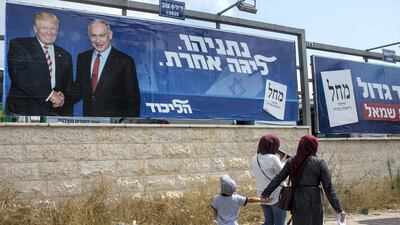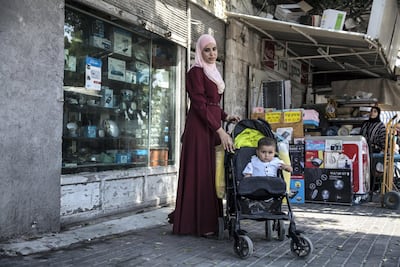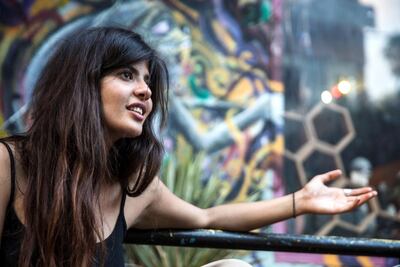Israelis go to the polls on Tuesday to elect a new parliament – only five months after Prime Minister Benjamin Netanyahu won an election but failed to form a government.
Among those eligible to vote are Arab and Palestinian citizens of Israel, also called Arab Israelis, who make up about 20 per cent of Israel’s 9 million citizens. While the Arab parties are historically marginal players in the country’s coalition-style politics, Mr Netanyahu’s Likud Party and other extreme-right candidates have used anti-Arab rhetoric to urge supporters to vote.
Vote for Netanyahu, they’ve implored in adverts and speeches, or the Arabs and leftists will take over.
Sondos Shaaban, a 28-year-old nurse from Ramla, in the centre of Israel, is confident about who she’ll be voting for: the Joint Arab List, an alliance of four Arab-majority political parties that span the spectrum from communists to Islamists.
"When there are those [Arabs] that represent me in the government, then my future will be better," she told The National as she ran errands with her one-year-old son days before the vote.
The Joint List first formed for the 2015 election, in which a record 63 per cent of eligible Arab voters participated, making it list the third largest party in Israel's parliament.
Fast forward four years to this April's election, and the Joint List broke up into two factions after personal and ideological differences strained the alliance. In part angry at the disunity of the Arab politicians, many Palestinian and Arab voters stayed home on election day, resulting in a turnout of only 49 per cent. Only one of the factions, Ram-Balad, scraped past the threshold of at least 3.25 per cent of the vote to enter parliament.
Soon after fresh elections were called, the leaders of the Arab parties announced the return of the Joint List – and have been trying to win back constituents and energise them to the polling booth ever since.
Joint List candidates have pledged to do more to tackle socio-economic issues, such as high rates of poverty, crime and unemployment in marginalised and under-served Arab communities.
For Ms Shaaban, boycotting the elections – as many Arabs disaffected with their parties and Israeli politics have chosen to do – isn’t an option.
She said she’s voting “so there will be change for the Arabs. So there will be a new law for the Arabs.” In particular, she referenced the Nation State law passed last year which effectively classed all non-Jews as second-tier citizens and which Arab politicians have been pushing to have repealed since.
Ms Shaaban said she didn't think Mr Netanyahu – who this summer became Israel’s longest-serving Prime Minister – would win this time. She’s betting on Likud’s centrist opponent, the Blue and White party, to surge ahead.
“Inshallah,” she said.

Eman Atshi, 18, voted for Blue and White in April, but this time, she's not voting at all.
“I voted last time and it didn't help,” she said.
Blue and White, led by a former Army Chief of Staff, "are racist [against Arabs]", said Eden Kavishy, 22, seated beside her with other friends at a chic cafe on Mossadeq Street in Haifa, a northern city that's a cultural centre of Arab and Palestinian life in Israel.
The country's future, Ms Atshi said, "is going down."
"All the way down," said another friend.
The women in their late teens and early 20s spoke in a mixture of Hebrew and Arabic. All were Druze, an Arab religious minority spread across Israel, Lebanon and Syria.
Men from Druze communities are required to complete military service (which is mandatory for all Jewish Israelis), unlike other Arab citizens, who are exempted.
That is partly why Ms Kavishy, who is studying computer science, is so angry with the Nation State law and so disaffected by politics.
"There's no party that really reflects the things that are important for me,” she said. “Even the left parties don't really support the things that are important to me [as a Druze in Israel]... They haven't done anything for me.
"As an Arab-Israeli young person, what interests me the most is that I get the rights that other people here get.”
In April, Ms Kavishy voted for the Green Party, a minor group focused on environmental issues which has never gained enough votes to enter parliament. This year, she has not yet decided.
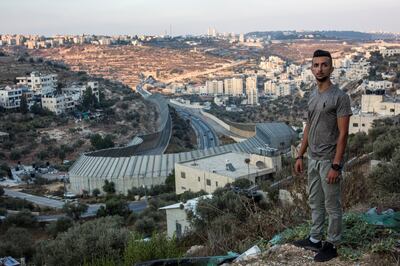
Unable to vote, but still controlled by Israeli policies, are Palestinian residents of Jerusalem as well as Palestinians living in the occupied West Bank and Gaza Strip.
There are about 350,000 Palestinians living in east Jerusalem who are permanent residents, meaning they can move around Israel and use Israeli institutions, but are not classed as citizens, so therefore cannot vote in national elections and cannot live too long outside of Jerusalem – among other restrictions on their residency.
While still stateless, their legal status is relatively better than that of the 2.5 million Palestinians in the West Bank living under the semi-autonomous Palestinian Authority and Israeli military rule. Another 1.9 Palestinians live in Gaza, under the extremist group Hamas and an Israeli-led blockade.
![Marah Mansour, 20, from Beit Hanina in east Jerusalem: "I honestly don't think that much about it [the elections] because it's for the Israelis". Heidi Levine for The National](https://www.thenationalnews.com/resizer/v2/SMUF7XNAD5YCXWNZBVKAUPKV4U.jpg?smart=true&auth=cfd88069d00bcc17279aff60290e9af8094bc440a53654707ea0a40b74da82dc&width=400&height=267)
"I honestly don't think that much about it [the elections]… because it's for the Israelis," said Marah Mansour, 20, from Jerusalem.
The anti-Arab rhetoric "makes me feel said", she said, because "it gives Palestinian people a bad name".
Ms Mansour is from Beit Hanina in East Jerusalem, a Palestinian neighbourhood right beside the Israeli settlement of Pisgat Ze'ev, which most Israelis by now consider a part of Jerusalem, and Qalandia checkpoint, the main crossing point into the Palestinian Territories.
Ms Mansour said she’d never considered applying for Israeli citizenship, as some Jerusalemites do, and doesn’t speak much Hebrew.
Instead of studying at an Israeli University, which she can do as a Jerusalem resident, she’s studying English Literature at Birzeit University, near Ramallah in the West Bank.
She loves her studies and the campus, but said it was a challenge navigating all of these different spaces.
“You feel like it's divided in two different countries,” she said of travelling from East Jerusalem, where Israeli border and paramilitary police patrol, into the West Bank. “It’s so hard to travel because of the Israeli checkpoints and everything and the traffic.”
And yet when she travels to other cities in Israel, she also feels out of place. “I feel like I’m out of my own town,” she said.
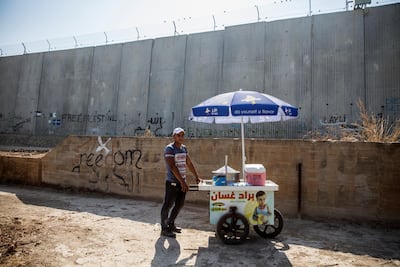
Islam Daoud, meanwhile, cannot travel into Jerusalem or Israel without a permit. Mr Daoud, 22, lives in the West Bank city of Qalqilya, an agricultural area cut off from neighbouring villages in Israel by the wall built in the mid-2000s. His grandfather, he said, had once owned land, now lost, on the other side.
The youngest of eleven children, Mr Daoud completed high school and now makes ends meet selling plastic cups of lemon-water ice for a shekel (Dh1.04) each.
He's never voted before – the PA hasn't had elections in over a decade – and didn't know very much about the coming Israeli elections.
What he does know, he said, is that “in the end the occupations remains… In the end, Palestine is occupied and the elections won’t change that.”
Last week, Mr Netanyahu pledged to annex the Jordan Valley, about 30 per cent of the West Bank, if re-elected – similar to a pledge he made in April's election. If he carries out the plan, the main Palestinian urban areas in the Jordan Valley would not be annexed, leaving them as isolated islands in yet another severe blow to the two-state solution.
Mr Daoud said he wasn’t worried Israel would annex Qalqilya, but he also saw “no future” in his life there.
Theoretically, "inside [Israel] is better", he said. "You'll find a house, you'll find work, you'll find everything. But from a social perspective, it's better here… I would rather be under Arab than Israeli rule."
